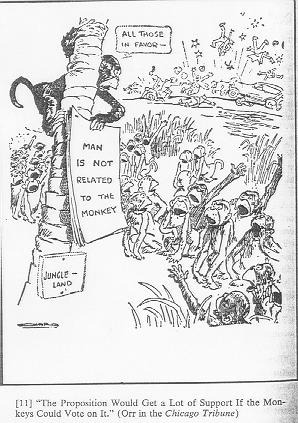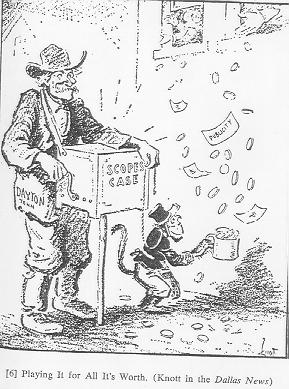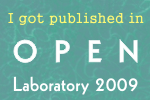Repost: the Scope(s) of Substance
This tweet from Neil Degrasse Tyson jolted me from a pleasant rest before tomorrow’s race:
…which led to the (in)famous Scopes Trial. On May 5, 1925 John Scopes was charged and subsequently tried, found guilty, and fined $100 for teaching Evolution, a violation of Tennessee’s Butler Act. The trial became a battleground for science vs. religion, evolution vs. creationism, and the interpretation of the Establishment Clause and Freedom of Speech in the US constitution.
I published a blog post two years ago, on the 85th anniversary of the trial, July 2010. Today marks the 87th anniversary of the arrest, so it seems like a good occasion to repost. Especially since there is still some work needed in the area of teaching evolution:
To follow is the original post: “The Scope(s) of Substance”, from July 29, 2010. Still relevant, I believe:
Bora Zivkovic, the BUCA (Best Universal Common Ancestor) of science bloggers has tagged this blog with with a Blog of Substance award. As a grateful recipient of this award I am obligated to do two things:
1. Sum up my blogging motivation, philosophy and experience in exactly 10 words.
2. Pass this award on to 10 other blogs.
Of course, I never do anything without researching it first, because I am such an awesome scientist, or detail-oriented !@#*^, depending on whether you ask me or my students. So I looked up “substance” in the Merriam-Webster dictionary. Here is what I found:
Main Entry: sub·stance
Pronunciation: \ˈsəb-stən(t)s\
Function: noun
Etymology: Middle English, from Anglo-French, from Latin substantia, from substant-, substans, present participle of substare to stand under, from sub- + stare to stand — more at stand
Date: 14th century1 a : essential nature : essence b : a fundamental or characteristic part or quality c Christian Science : god 1b
2 a : ultimate reality that underlies all outward manifestations and change b : practical importance : meaning, usefulness
3 a : physical material from which something is made or which has discrete existence b : matter of particular or definite chemical constitution c : something (as drugs or alcoholic beverages) deemed harmful and usually subject to legal restriction4 : material possessions : property
Hmmm… 2a and 2b seem to be relevant. Perhaps 3c should be too, as my blogging could be construed harmful to other more productive activities, which I am obviously not engaged with at this moment. Actually you, gentle reader, are not engaged in more productive activities either right now. Be that as it may, the word substance does seem to have an air of permanence about it, which is contrary to the perceived ephemeral nature of blogging. Bora is actually one of the people who are doing something about making blogs less ephemeral by publishing The Open Laboratory collection (full disclosure: I’m published in the 2009 book) and by supporting science bloggers, blogging and activities wherever they may be. This makes me so happy to be among Bora’s chosen 10 (OK, 11, he cheated a bit) among the hundreds of blogs he must be reading. Thanks Bora!
I do wonder though, eighty-five years from now, how many of us science bloggers would be remembered for our blogging? Well, maybe not as individuals, but what kind of impact are we having now, and how much will it remain 85 years from now? Hopefully as a collective, science bloggers are impacting the understanding of science, which is one of the reasons I am blogging. Hopefully, we do have substance, as a group if not as individuals.
Why eighty-five years? Well, the answer to that brings me to the main topic (substance?) part of this post, which is the anniversary of the Scopes trial. This month, 85 years ago, a schoolteacher in Tennessee was convicted of a high misdemeanor for violating the State of Tennessee’s Butler Act which prohibited the teaching of evolution in any of the state’s public schools and universities. He was fined $100.
PUBLIC ACTS
OF THE
STATE OF TENNESSEE
PASSED BY THE
SIXTY – FOURTH GENERAL ASSEMBLY
1925________
CHAPTER NO. 27
House Bill No. 185
(By Mr. Butler)
AN ACT prohibiting the teaching of the Evolution Theory in all the Universities, Normals and all other public schools of Tennessee, which are supported in whole or in part by the public school funds of the State, and to provide penalties for the violations thereof.
Section 1. Be it enacted by the General Assembly of the State of Tennessee, That it shall be unlawful for any teacher in any of the Universities, Normals and all other public schools of the State which are supported in whole or in part by the public school funds of the State, to teach any theory that denies the story of the Divine Creation of man as taught in the Bible, and to teach instead that man has descended from a lower order of animals.
Section 2. Be it further enacted, That any teacher found guilty of the violation of this Act, Shall be guilty of a misdemeanor and upon conviction, shall be fined not less than One Hundred $ (100.00) Dollars nor more than Five Hundred ($ 500.00) Dollars for each offense.
Section 3. Be it further enacted, That this Act take effect from and after its passage, the public welfare requiring it.
Passed March 13, 1925
W. F. Barry,
Speaker of the House of Representatives
L. D. Hill,
Speaker of the Senate
Approved March 21, 1925.
Austin Peay,
Governor.
Seems incredible at this day an age… or maybe not so incredible given recent events in Louisiana.
The trial, which originated as something of a publicity affair for the town of Dayton, Tennessee, quickly became a battleground for evolution vs. creation. In the short term, the trial actually increased the number of anti-evolution bills proposed in different state legislatures in the US. In the long term, however, Tennessee vs. Scopes is seen as a watershed moment in the teaching and public acceptance of evolution, and has had long terms ramifications in the US and internationally. Scopes himself spoke only once at the trial, was not called to testify, and only had this to say when granted a statement after sentence was passed:
Your honor, I feel that I have been convicted of violating an unjust statute. I will continue in the future, as I have in the past, to oppose this law in any way I can. Any other action would be in violation of my ideal of academic freedom — that is, to teach the truth as guaranteed in our constitution, of personal and religious freedom. I think the fine is unjust.
Now that is substance.
Back to the award; I still have some conditions to fulfill:
1. Sum up your blogging motivation, philosophy and experience in exactly 10 words.
1Blogging 2motivation, 3philosophy 4and 5experience 6cannot 7be 8summed 9in 10ten 11words.
2. Pass this award on to 10 other blogs
Given the 10n growth rate of tagged blogs, chain-letter fashion, I wonder about how this Blogging with Substance award has originated. Search engines was no help, as so many blogs are now tagged with the Blogging with Substance. If someone has an answer, let me know. Anyhow, here are my 10 tags, based on what I am reading nowadays, ephemerality of blogging substance, and all that jazz. Tough choices though, so many good blogs out there:
2. Sandwalk
3. Thoughtomics
4. The Loom
6. Genomics, Evolution and Pseudoscience
10. Mystery Rays form Outer Space
Final word: if this post seems a bit confused, and you are not sure that you are “getting it”, well, that’s this post’s substance.
Comments are closed.























